The 10 greatest ski resorts in Canada

With plentiful snowfall and quiet slopes, Canada offers huge attractions for skiers and snowboarders. A ski holiday across the Atlantic offers a welcome change to the familiarity of the Alps, with different rules on the mountain, new activities to try and a real sense of wilderness in some resorts. Thousands of Britons opt to ski in Canada over Europe year after year, and for good reason.
For starters, the piste grooming is great, and anyone going off-piste within the boundaries of the ski area can do so without a guide – although the service of a local professional is strongly advised for finding the best pitches, as well as general orientation during a one- or two-week trip.
This is because, unlike in Europe, all this designated terrain, however steep or challenging, is avalanche-controlled and patrolled. Nonetheless, the person in charge of your personal safety is yourself: it’s important at all times to remain aware of changing snow and weather conditions.
Canada is also home to some of the best heli-skiing and cat-skiing in the world, usually outside the ski area boundary. Cat-skiing, largely unknown in Europe, involves being taken up the mountain in a snowcat (like a piste basher with a passenger cabin) thereby reaching terrain otherwise only accessible by helicopter. It has two distinct advantages over the airborne version – it’s kinder on the wallet and there’s a welcome long rest between runs as the snowcat trundles back up the hill from the bottom of the run.

Unfavourable exchange rates combined with long-haul airfares inevitably make ski holidays to North America more expensive than in Europe. However, Britons get more for their money in Canadian resorts than in America. Costs in the big-name resorts of Banff and Whistler in Canada are generally lower than in equally well-known Breckenridge and Vail in the USA.
Visitors flying to Canada (or connecting through a Canadian airport) need to apply for an Electronic Travel Authorization (ETA). It costs C$7 via an online application form at canada.ca/eta and lasts for the duration of your trip.
If you’re eager to escape the familiarity of the Alps and discover the enduring appeal of Canada’s slopes here are the top 10 resorts to guarantee the best time and everything you need to know before visiting.

Revelstoke, BC
Best for powder
Until 2008, Revelstoke attracted only a contrasting clientele of wealthy international heli-skiers and a scattering of locals, who frequented slopes served by one short lift. But then a world-class gondola and two fast chairlifts transformed it into a 1,214 hectares (3,000 acre) resort with the biggest vertical in North America (1,713m).
Revelstoke attracts huge amounts of powder snow – around 12m a year on average – and much of the terrain is steep and ungroomed. There are wonderful glades of trees and a big open bowl accessed through a cliff band – it’s essential to know the best ways in. The ski school offers half- and full-day private guiding – a must for any keen skier or snowboarder. The Steller quad chairlift accesses some beginner and intermediate terrain, giving the resort a family appeal that it previously lacked before.
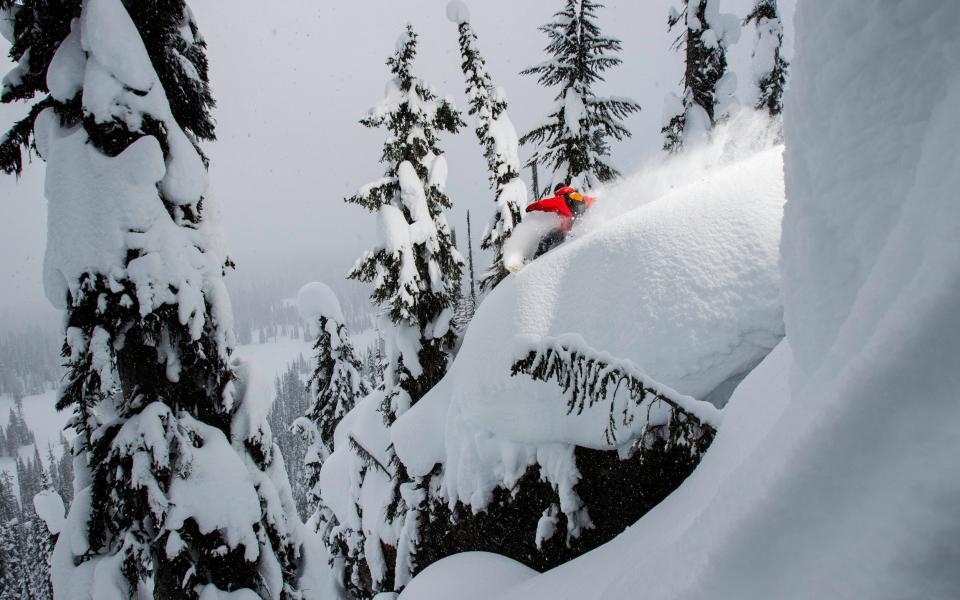
The resort also has its own snowcat and heliskiing operations for accessing untracked snow. For committed powder hounds, the great beauty of Revelstoke is that there’s no need to book a full heli package and risk expensive ‘down days’ when weather conditions prevent helicopters flying. Instead, the decision on whether to heliski, snowcat ski or simply ride the gondola to explore the ample terrain can be made each morning after looking out of the window.
A new slopeside 154-room hotel is currently nearing completion, across from the existing Sutton Place Hotel. It has three helipads outside the door and will become the new home of resort-owned Selkirk Tangiers Heli Skiing.
There’s also a choice of hotels including the new Basecamp Suites in the heart of unpretentious Revelstoke town, a five-minute drive away, served by a daytime bus service and with a fair choice of restaurants and bars.
Where to stay
British-owned Chalet Bighorn at the resort village has eight extremely large bedroom suites and consistently wins awards as the top luxury chalet in North America – the quality of service and cuisine is extraordinary. There is a spa with pool, gym, sauna and massage rooms, cinema, outdoor hot tub and private helipad. From C$90,000 (£49,700), booked direct. A less exotic alternative is to stay in the historic old town at the Basecamp Suites, from C$326 (£119) per night in a one-bedroom suite, booked direct. Both exclude travel.
Alternatives
Whistler gets an average of almost 12m of snow a year and has high bowls and chutes that are usually powder filled. Big White is ideal for first powder turns, with regular snowfalls and lots of easy intermediate slopes.
Fernie, BC
Best for experts
Fernie has long held cult status among locals in the western Canadian provinces of Alberta and British Columbia because of its abundant snowfall (up to 11m some seasons and 9m on average) and the adventurous nature of its terrain. Slopes are steep, many of them ungroomed and largely in the shelter of trees. All this makes it a superb mountain for experts, as long as you know where you’re going.
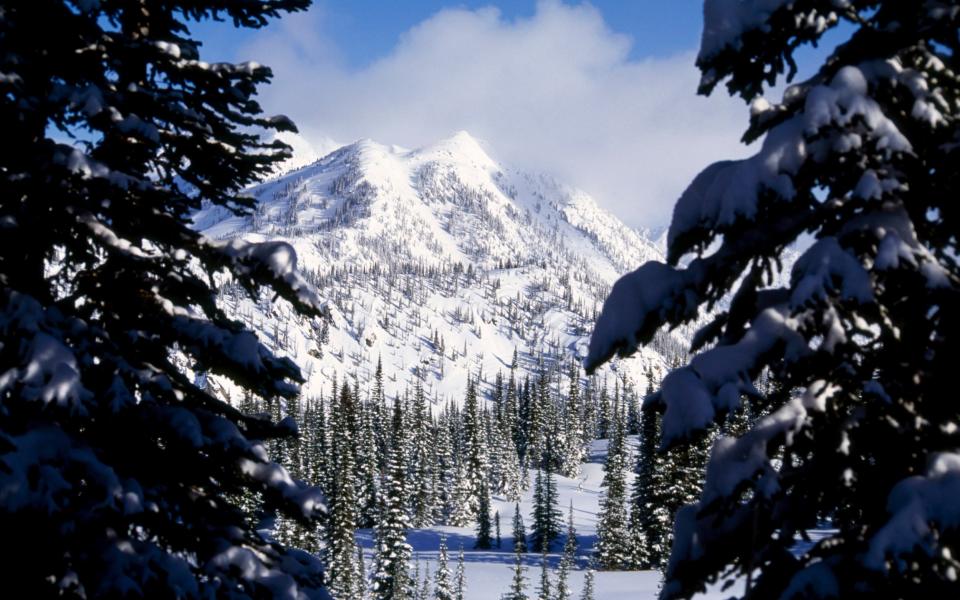
To get the most out of Fernie’s 1,012 hectares (2,500 acres) of terrain across five alpine bowls it’s best to be shown around the ski area by a local early in the holiday. The resort’s two-day Steep and Deep Camps are only held once a month, but are well worth joining. The other option is to book a shared mountain guide session through the ski school, specifically asking for an ungroomed terrain group.
There are also great snowcat operations nearby – Island Lake Catskiing and Fernie Wilderness Adventures. Fernie’s resort village is convenient but small, with few eating and drinking options. Fernie town, a couple of miles away, has a much better selection of bars and restaurants.
Where to stay
Situated at the base of the slopes, Lizard Creek Lodge is an extremely comfortable and conveniently located ski-in/ski-out hotel with a heated outdoor pool and a hot tub. From £2,245, including car hire, with Ski Solutions.
Alternatives
Revelstoke and Kicking Horse both have great steep and deep terrain. Whistler has more steep terrain than any other resort in North America.
Sun Peaks, BC
Best for beginners
Canada is a long way to go to learn to ski or snowboard, but for those prepared to make the transatlantic journey, Sun Peaks is a great place for first turns. It has a friendly, attractive, small village comprising low-rise pastel-coloured buildings with a vaguely Tirolean feel, and a short traffic-free main street. Plus, the majority of the accommodation is ski-in/ski-out.
The ski area revolves around three peaks: Mount Morrisey, Sundance and the largest one: Mount Tod. Together the three mountains claim 138 runs and more than 1,728 hectares (4,270 acres) – much the same as Lake Louise. The only Canadian resort with more terrain is Whistler.
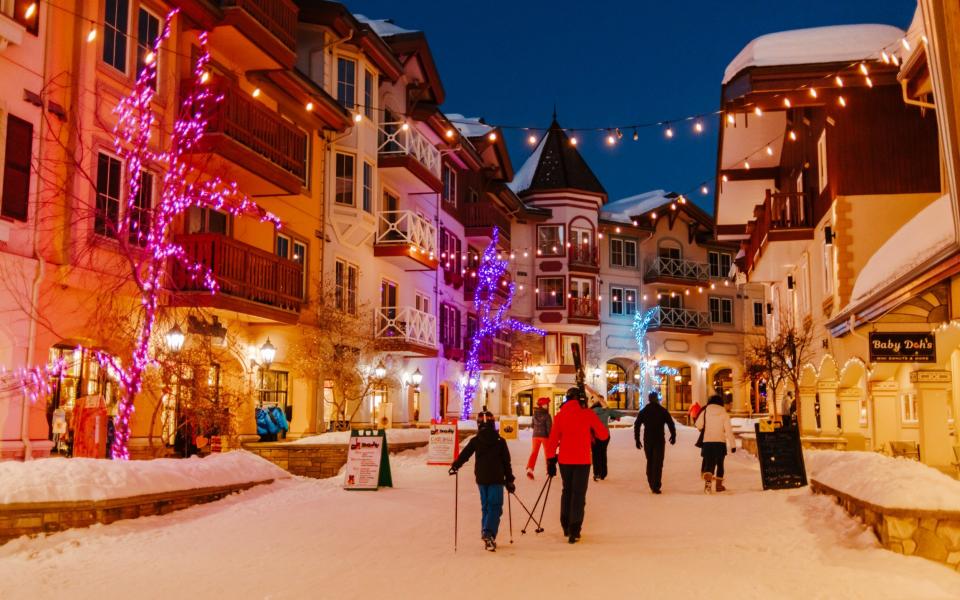
The main nursery slopes are served by the Village Platter lift at the foot of Sundance, right by the village centre and lifts, and there are long easy green runs to progress to, including the 5 Mile top-to-bottom run on Mount Tod, which has a vertical of more than 800m. For the more experienced there is intermediate cruising on blue pistes along with easy groomed and gladed tree runs, plus some seriously steep black runs.
Where to stay
Sun Peaks Grand Hotel is the resort’s smartest hotel. It has a hot tub and pool, spa and games room, and is ski-in/ski-out. From £1,580 for 10 nights, for family of four sharing a deluxe room, with Ski Safari.
Alternatives
Silver Star is a compact, car-free resort with a beginner area right by the village and easy runs to progress to. Although best known as an experts’ mountain, Fernie also has a great nursery slope and quiet, gentle runs to practise on.
Big White, BC
Best for ski-in/ski-out convenience
North American resorts aren’t particularly known for their ski-to-the-door convenience, but some have been purpose-built for easy access to the slopes. Of these, among the most convenient is Big White – virtually all the hotels and apartments in this modern resort are ski-in/ski-out, with the main lifts starting below village level. Even the main street through the centre of the resort is a designated ski run and can be traversed to get back to the accommodation. The vertical drop is a respectable 777m.
The 2,765 acres (1,119 hectares) of patrolled terrain suits intermediates best, and an abundance of snow combined with lots of trees for shelter means it’s a great place to learn to ski powder. The fast four-person Powder Chair makes it easy to access gladed tree runs for all levels on the upper mountain.
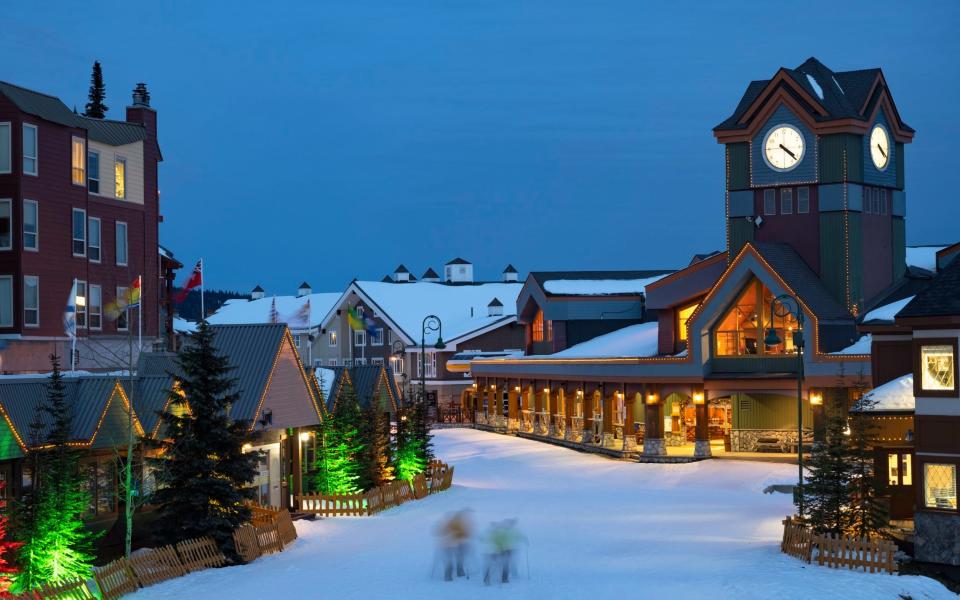
An area called Happy Valley at the bottom of the village offers activities such as ice skating (Canada’s highest outdoor rink), snowmobiling, tubing, ice climbing and snowshoeing, and is served by a gondola that runs until late. The village has limited après bars and shopping, but there are some decent restaurants.
Where to stay
White Crystal Inn is ski-in/ski-out and located next to the Gondola and Bullet Express chairs. Rooms are spacious and vary from standard to loft rooms. The BullWheel Gastro Family Pub is on site. From £1,349, with Frontier Ski.
Alternatives
Panorama is a purpose-built resort with some lodgings set right at the lift base and others slightly below, linked by a little gondola. In Silver Star the lodgings are halfway up the hill, so the day can start with a run not a lift.
Whistler Blackcomb, BC
Best all-rounder
Whistler’s two linked mountains, Whistler and Blackcomb, together form the biggest ski area in North America, 3307 hectares (8,171 acres), with 200 trails and 37 lifts. This automatically puts it on the shortlist of most transatlantic visitors – and certainly intermediates who like to rack up the kilometres without repeating the same slopes.
For beginners, there are top-to-bottom green runs to which you can progress after leaving the nursery slopes, and Whistler mountain is very beginner friendly, thanks to a learning area with covered magic carpet lifts, along with plenty of snowmaking and confidence-building green runs.
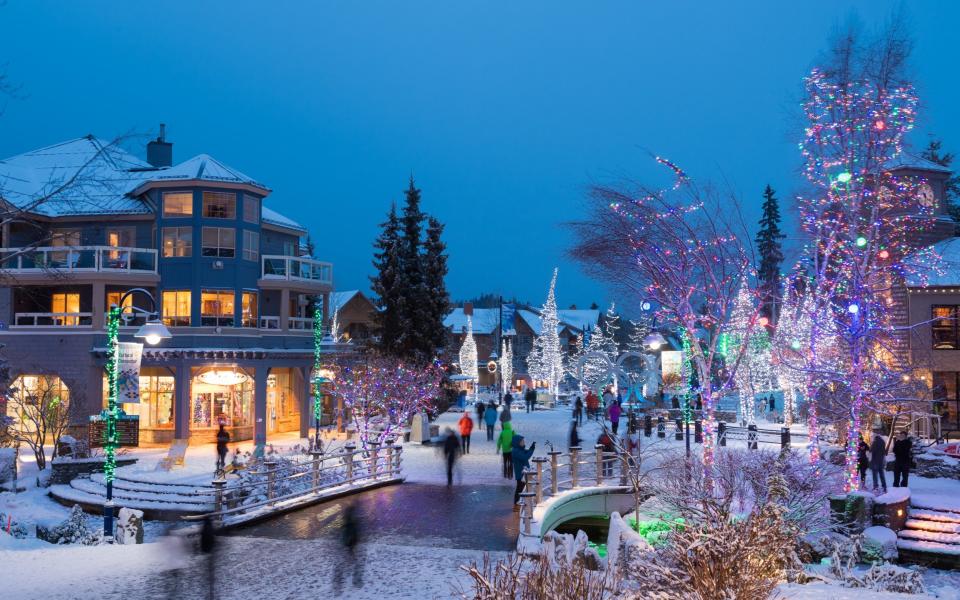
For experts, the numerous high open bowls offer a wide range of possibilities, complemented by regular dumps of powder streaming in from the nearby Pacific. There are also world-class terrain parks. The downside can be the weather – it often rains in town, but that usually means snow higher up. As the locals say: ‘If you don’t like the weather, wait five minutes.’
Vail Resorts has owned Whistler since 2016, which means that the lifts are consistently upgraded. For 2024/25 the Jersey Cream Express chairlift on Blackcomb Mountain has been upgraded to a high-speed, six-person chairlift, increasing uphill capacity by 29 per cent. The purpose-built resort village is big and busy, with lots of bars and restaurants. It has a lively après scene from mid-afternoon onwards, and a wide range of shops. There’s also plenty for non-skiers to do, from zip lines and tubing to snowmobiling and eagle-watching trips.
Where to stay
Crystal Lodge & Suites is set in the heart of Whistler Village. It’s close to the restaurants and shops and a two-minute walk from the lifts. There’s a heated outdoor pool, hot tub and rock sauna. From £1,32, with Inghams.
Plan a visit with our Whistler ski guide.
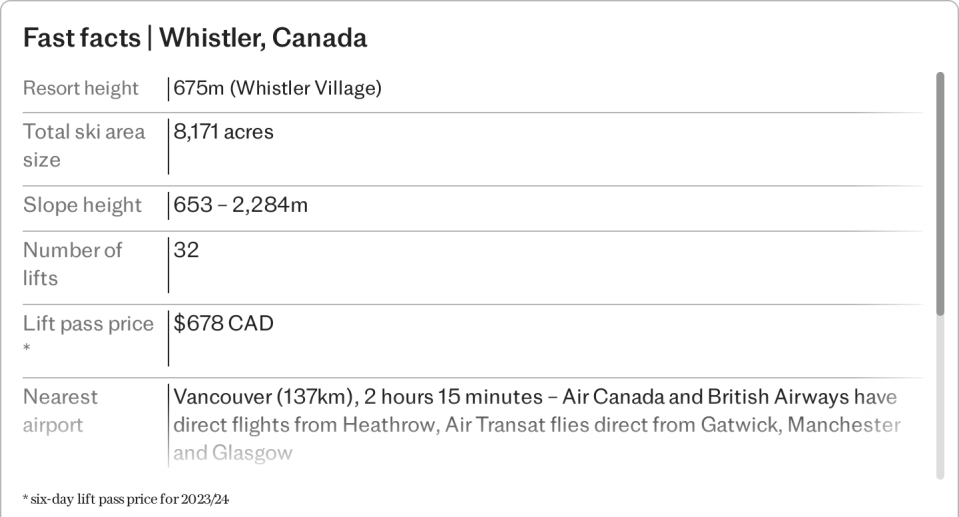
Alternatives
While nowhere else is quite in the same league as Whistler, Panorama has excellent terrain for beginners, experts and adventurous intermediates. However, it’s a bit limited for wobbly second-weekers and less proficient skiers. In Lake Louise, all three sectors have plenty to amuse intermediates and experts alike, though deep powder is not a certainty. For beginners, there are good nursery slopes by the base lodge.
Banff, Alberta
Best for value
Banff does not necessarily have lower in-resort prices than its rivals, but it does offer one key advantage over other Canadian resorts – tour operators offer great-value package holidays here. The town sits at the gateway to a fabulously scenic drive through mountainous national parks that attract huge numbers of summer tourists. Accommodation created to meet this demand is relatively cheap during the less busy winter season.
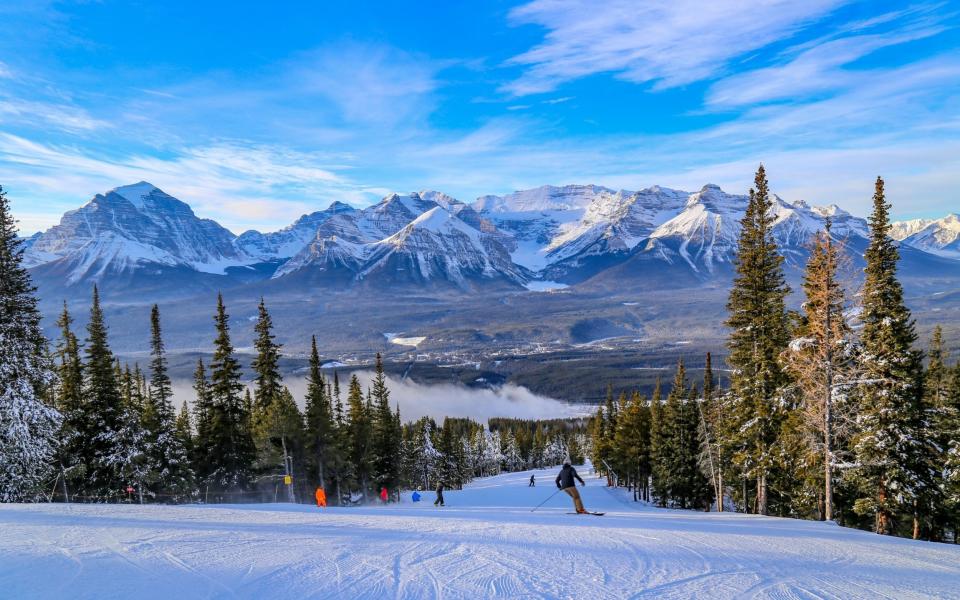
Banff itself is a jolly little tourist town with more than 100 bars and restaurants, and countless souvenir shops. Three ski areas are covered by the lift pass, each a free bus ride from town. Norquay is only a few minutes away, but tiny, with just six lifts and 77 hectares (190 acres) of terrain including a good nursery area.
Sunshine Village, 20 minutes away, is a fair size 1,359 hectares (3,358 acres) and 13 lifts. It is known for its steep terrain and plenty of snow. A heated fast quad chairlift on Lookout Mountain gives access to some double black diamond runs in comfort. Lake Louise, 45 minutes away (see below), is the largest area, with 1700 hectares (4,200) acres of terrain and 13 lifts, best suited to intermediates and experts. For the 2024/25 winter season, Sunshine has the new Super Angel lift and Lake Louise the new Upper Juniper Express – both are heated six-person chairs with bubbles.
Where to stay
Three-star family-run Rundlestone Lodge is 15 minutes’ walk from the town centre, with a bus stop nearby. The lodge has a lobby with a wood-burning fireplace, an indoor swimming pool, hot tub, gym and restaurant. From £1,069, with Skiworld.
Plan a visit with our Banff ski guide.
Alternatives
Jasper, which serves the nearby Marmot Basin ski area, is a big summer destination like Banff, so it also has plenty of competitively priced lodgings in winter along with a useful ski area with 696 hectares of terrain. Kimberley is a small resort with ski-in ski-out lodgings offering some keenly priced packages.
Silver Star, BC
Best for charm
The core of this cute village was built in the 1980s to resemble a 19th-century mining village. Silver Star is based around a tiny traffic-free square lined with brightly painted Victorian-era style buildings, wooden sidewalks and faux gaslights. One side of the village opens right onto the slopes. Individual houses built in the same style and colours are dotted around the slopes above. Nearby, there’s a natural ice rink on a lake and a tubing hill. Nearly all accommodation is either ski-in/ski-out or less than 30 seconds walk to the snow.
The 1,328 hectares (3,282-acres) of slopes served by 10 lifts suit all standards, with a mixture of easy green runs, intermediate cruising on well-groomed trails plus a dense network of single- and double-black diamond runs plunging through the trees, many of them top-to-bottom mogul fields. There are also challenging gladed-tree runs in both the Putnam Creek and Silver Woods sector. For those wanting to head straight to the top, a fast gondola links the village to the resort high point at Summit, 1,915m. Vertical drop is 760m.
The ski school has an excellent reputation. There’s also plenty to do off the slopes, and Silver Star’s all-inclusive My1Pass lift pass includes tubing, skating and access to cross-country skiing, snowshoeing and winter mountain bike trails, as well as access to the slopes.
Where to stay
The ski-in/ski-out Firelight Lodge is in the heart of Silver Star’s village. From £1,496, with Ski Independence.
Alternatives
Tremblant has a charming village, purpose-built in the style of old Quebec, with narrow cobbled streets at the foot of a small area of varied slopes. Sun Peaks is a small purpose-built resort with a main traffic-free street of pastel-coloured buildings. The ski area is the second biggest in Canada.
Panorama, BC
Best for families
The largely car-free resort village in Panorama is on two levels, linked by a free gondola. The upper village is traffic free and has lots of accommodation with direct access onto the snow. This is based around a skating rink and outdoor hot pool complex, with swimming pools, water slides, hot tubs and a sauna. All are free to use if staying at one of the six residences collectively known as the Upper Village Condos.
There is a good range of child-care options available. The Wee Wascals centre looks after children aged from 18 months to five years, while a combination of child-care and ski school is available for three-year-olds upwards. Daily activity programmes are offered, and there’s a list of babysitters for out-of-hours care.
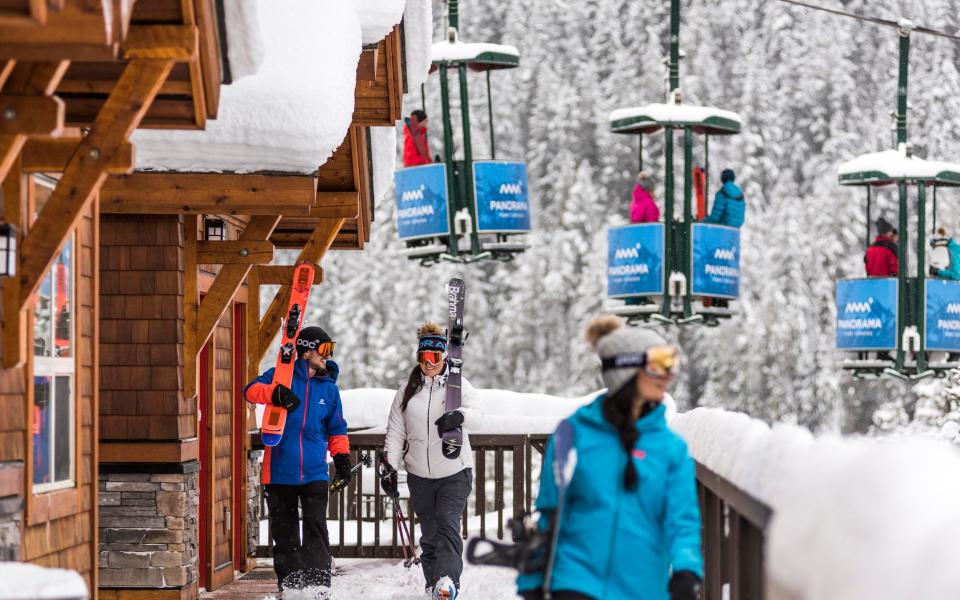
Panorama mountain has 1,203 hectares (2,975 acres) of terrain and a 1,300m vertical, one of the biggest in North America, and there are slopes to suit beginners, adventurous intermediates and experts. A dedicated Discovery Zone near the bottom of the mountain, with easy-to use lifts and gentle green runs, is ideal for beginners and young families, while the wide, groomed trails and mellow off piste of the mid-mountain suit intermediates.
For experts, there are two black-run powder bowls accessible from the resort high point of 2365m. RK Heliski is based in the village, with a big lodge and heli-pad; it specialises in taking out first-timers and provides super fat skis or snowboards to make powder easier.
Where to stay
The Approach is a Scandinavian-inspired apartment building located at the bottom of a green run and the chair lift in the town centre. The Panorama hot pools are free to use and just a short walk away. From £1,280, with Iglu.
Alternatives
Sun Peaks is a small purpose-built village with one main, traffic-free street and comprehensive child-care facilities through the Sundance Kids Centre and the ski school’s Sun Tots and Sun Kids programmes. Big White has lots of convenient ski-in/ski-out accommodation, Tot Town Daycare in the main square, and kids ski school programmes.
Lake Louise, Alberta
Best for scenery
Lake Louise is spectacularly set in Banff National Park, with great views from the ski area of peaks and glaciers including Canada’s Matterhorn lookalike, Mount Assiniboine. The view from the Fairmont Chateau Lake Louise hotel of the Victoria Glacier, above the frozen Lake Louise itself, is simply stunning.
The 1,700 hectares (4,200 acres) Lake Louise ski area offers runs to suit all standards, including lots of ideal intermediate terrain. There is no accommodation at the ski area, but it’s only a couple of miles drive or bus ride away from tiny Lake Louise village. This a charming, relaxed place to spend a week, with a few scattered hotels, includin Chateau Lake Louise, restaurants and bars.
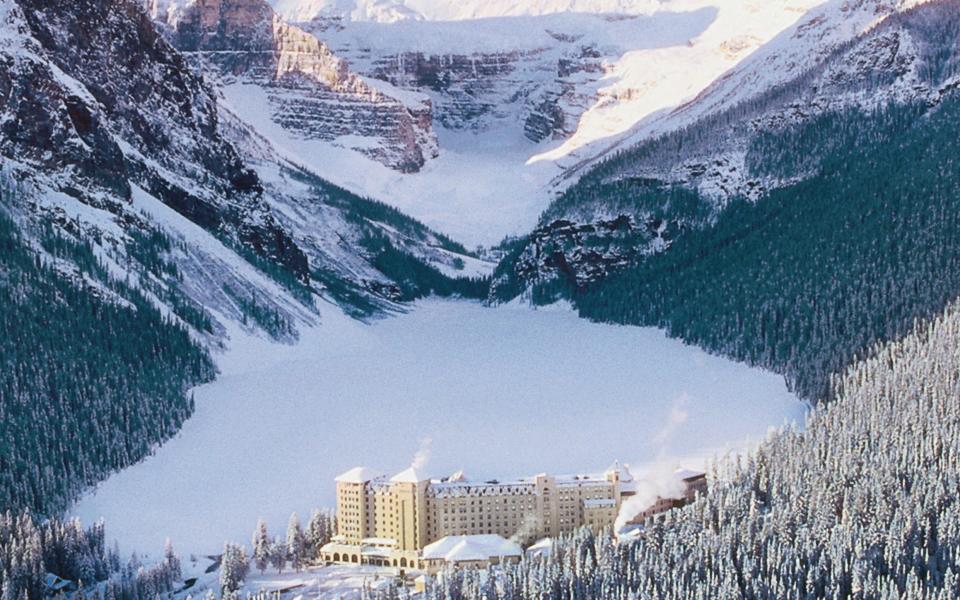
The presence of this hotel in a remote and scenic corner of the Banff National Park is thanks to a feat of Victorian engineering. The general manager of the Canadian Pacific Railway was inspired to build a place for train passengers to rest in comfort while drinking in one of the most dramatic glacial vistas of the Rockies. A simple chalet was built in 1890, and the first Chateau Lake Louise in 1911. Skiing became a popular pastime here in the 1920s, although the first lift was only constructed in 1954.
For variety or a night out, the town of Banff is a scenic 45-minute drive away. It has two ski areas worth exploring – Sunshine Village and Mount Norquay – as well as lots of bars and restaurants.
Where to stay
Lake Louise Inn has comfortable rooms, a bar, on-site restaurants, indoor pool, saunas and whirlpools. It is located close to the ski bus stop and a five-minute walk from the village centre. From £1,210 with SNO.
Alternatives
Whistler offers spectacular views from the top of glaciers and high open bowls and ridges, plus the views down to Fitzsimmons Creek from the Peak 2 Peak gondola – the world’s longest and highest lift of its kind, which connects Whistler and Blackcomb peaks – are breath-taking.
Plan a visit with our Banff ski guide.
Red Mountain, BC
Best for bragging rights
Relatively unknown to British skiers, Red has long been a cult resort for experts who can handle the steep terrain and tree runs of its original Granite mountain. That said, while much of Red’s 1,558 skiable hectares (3,850 acres) is given over to gnarly black runs, a second, smaller mountain, Grey, with 1,000 acres, offers mainly intermediate terrain.
For experts, Red also has a patrolled ski area on Mount Kirkup, accessed by snowcat giving a backcountry feeling within the ski area. The service is good value, and there are also other challenging cat-skiing areas nearby. Red has a total of just eight lifts but the give access to an extraordinary amount of varying terrain.
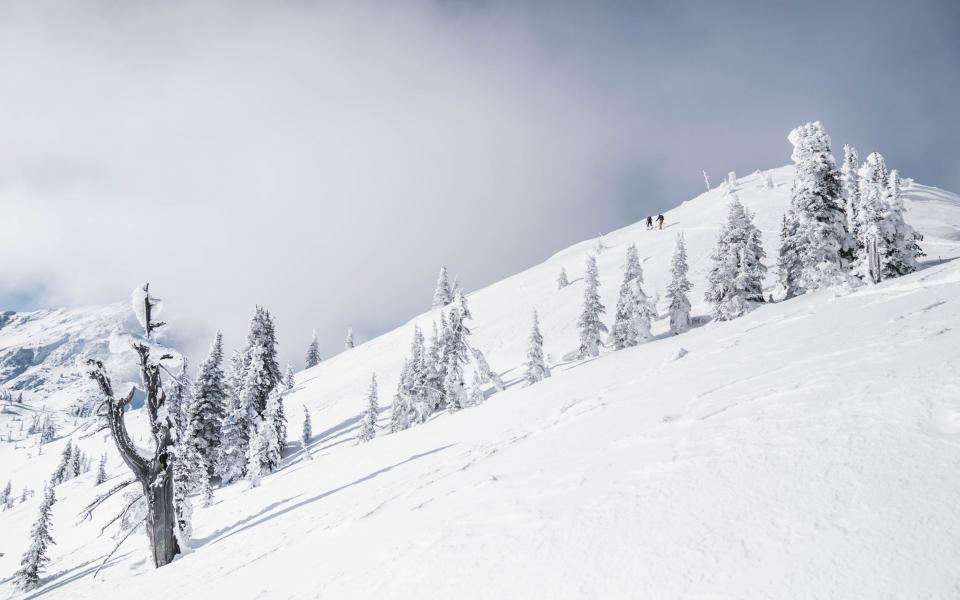
All four of Red’s chairlifts are slow. Runs are marked on the piste map, but not nearly so clearly on the mountain, so having a local guide is helpful. Many retired locals volunteer to guide visitors around in return for a free lift pass – and they are likely to be experts. More Canadian ski team members over the years originate from Red than anywhere else in Canada.
As well as accommodation at the base there is more in the small old mining town of Rossland, 4km away and served by free shuttle-buses. The town has a laid-back, welcoming atmosphere.
Where to stay
The funky Josie is Red Mountain’s only ski-in/ski-out hotel and one of Canada’s best ski boutique hotels. Located next to the Silverlode chairlift, it has 106 rooms, suites and a penthouse. There’s a spa with a slopeside outdoor pool, and a bar. From £2,600, including six nights at the Josie, a five-day lift pass, one night with dinner in a mountain cabin, one day’s guided skiing, one day’s cat-skiing, travel not included, with Mabey Ski.
Alternatives
Whitewater is about an hour and a half away from Red and has an equally cult reputation for ungroomed steep terrain. Kicking Horse was originally developed when a new gondola opened up what was previously purely heliskiing terrain; today there’s a tiny village at the base.
Unless stated otherwise, package prices are per person, based on two sharing a double or twin room, room only or self-catering, for seven nights, including flights and transfers.
This articles was first published in November 2022, and has been revised and updated.


